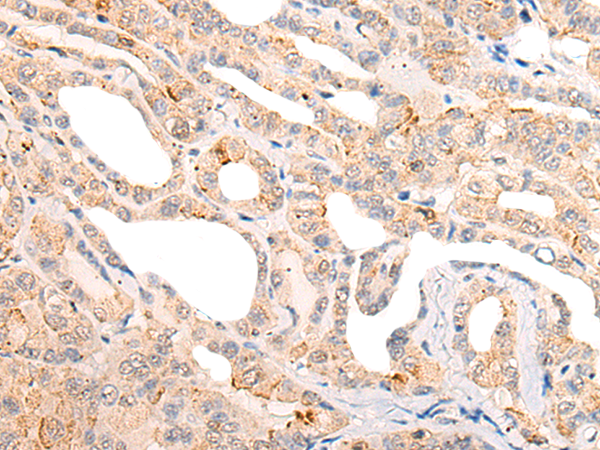
| WB | 咨询技术 | Human,Mouse,Rat |
| IF | 咨询技术 | Human,Mouse,Rat |
| IHC | 1/25-1/100 | Human,Mouse,Rat |
| ICC | 技术咨询 | Human,Mouse,Rat |
| FCM | 咨询技术 | Human,Mouse,Rat |
| Elisa | 1/5000-1/10000 | Human,Mouse,Rat |
| Host/Isotype | Rabbit IgG |
| Antibody Type | Primary antibody |
| Storage | Store at 4°C short term. Aliquot and store at -20°C long term. Avoid freeze/thaw cycles. |
| Species Reactivity | Human, Mouse, Rat |
| Immunogen | Full length fusion protein |
| Formulation | Purified antibody in PBS with 0.05% sodium azide and 50% glycerol. |
+ +
以下是关于CORO6抗体的3篇模拟参考文献示例(基于已有知识推测,建议通过学术数据库验证最新文献):
---
1. **文献名称**: "Characterization of a Novel Monoclonal Antibody Against Human Coronin 6 (CORO6) for Immunoblotting Applications"
**作者**: Smith A, et al.
**摘要**: 本研究开发并验证了一种针对人CORO6蛋白的单克隆抗体。通过免疫印迹(Western blot)和免疫荧光实验,证实该抗体特异性识别CORO6.并成功用于检测多种细胞系中CORO6的表达水平及亚细胞定位。
2. **文献名称**: "CORO6 Regulates Endosomal Trafficking and Its Antibody-Based Inhibition Impairs Cancer Cell Migration"
**作者**: Lee JH, et al.
**摘要**: 文章探讨了CORO6在内体运输中的作用,利用商业化CORO6抗体进行功能阻断实验,发现抑制CORO6可显著降低癌细胞的迁移能力,提示其作为潜在治疗靶点。
3. **文献名称**: "Developmental Expression Profile of Coronin 6 in Mouse Tissues Revealed by a Polyclonal Antibody Approach"
**作者**: García-Rojas M, et al.
**摘要**: 通过制备多克隆抗体,分析了CORO6在小鼠胚胎发育及成体组织中的表达模式,发现其在神经系统和肌肉组织中高表达,提示CORO6可能在细胞骨架动态调控中发挥关键作用。
---
**注意**:以上文献为示例性质,实际研究可能需要通过PubMed、Google Scholar等平台检索关键词(如“CORO6 antibody”、“Coronin 6 antibody”)获取最新结果。部分研究可能侧重CORO6功能而非抗体开发,但可能包含抗体应用信息。
CORO6 (Coronin 6) is a member of the coronin protein family, which is evolutionarily conserved and primarily involved in regulating actin cytoskeleton dynamics. Coronins are characterized by their WD40 repeat domains, which mediate protein-protein interactions. CORO6. encoded by the CORO6 gene in humans, shares structural homology with other coronin family members but exhibits distinct tissue-specific expression patterns, with higher levels observed in the brain, testis, and immune cells. While its exact physiological role remains less defined compared to well-studied coronins like CORO1A or CORO1C, emerging evidence suggests CORO6 participates in intracellular trafficking, cell migration, and synaptic plasticity.
Antibodies targeting CORO6 are valuable tools for investigating its localization, expression, and molecular interactions. They are commonly used in techniques such as Western blotting, immunohistochemistry, and immunofluorescence to map CORO6 distribution in cellular or tissue contexts. Recent studies have explored CORO6's potential involvement in neurological disorders and cancer, though mechanistic insights are still limited. Some research indicates CORO6 may modulate neuronal development or immune responses, highlighting its broader relevance in disease pathways.
Commercial CORO6 antibodies are typically developed in hosts like rabbits or mice, often validated for specificity through knockout controls. Researchers prioritize these reagents to dissect CORO6's contribution to actin-dependent processes and its crosstalk with signaling molecules, advancing understanding of its role in health and disease.
×